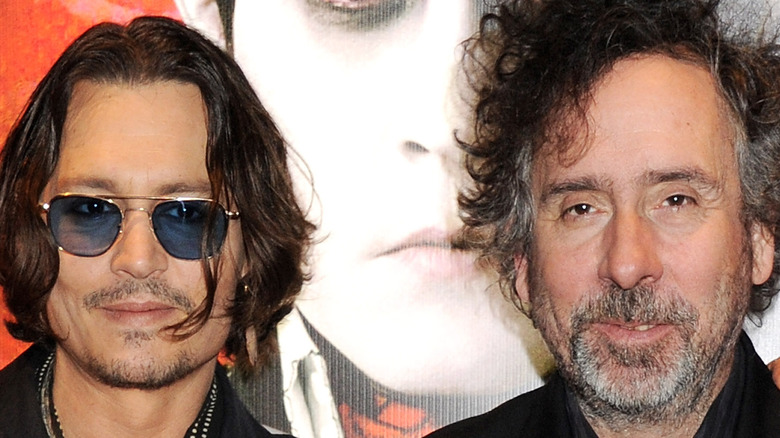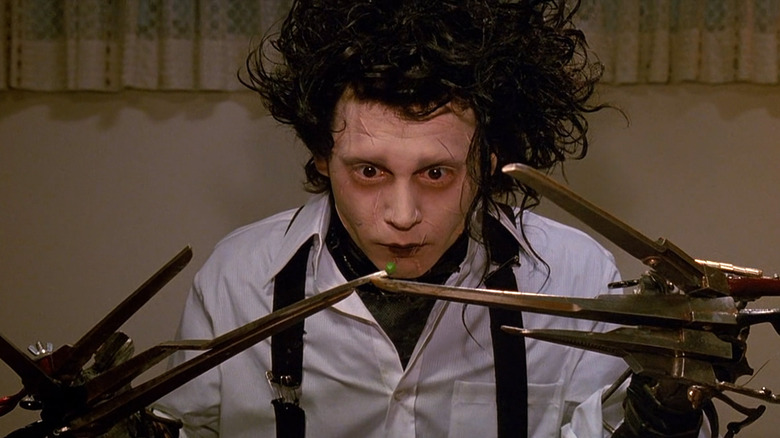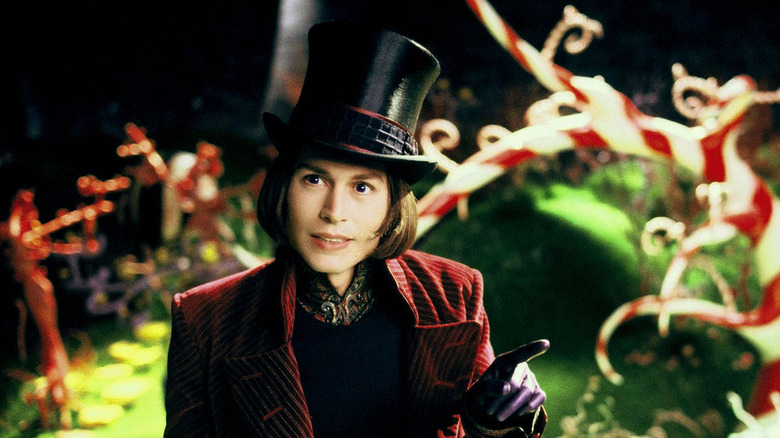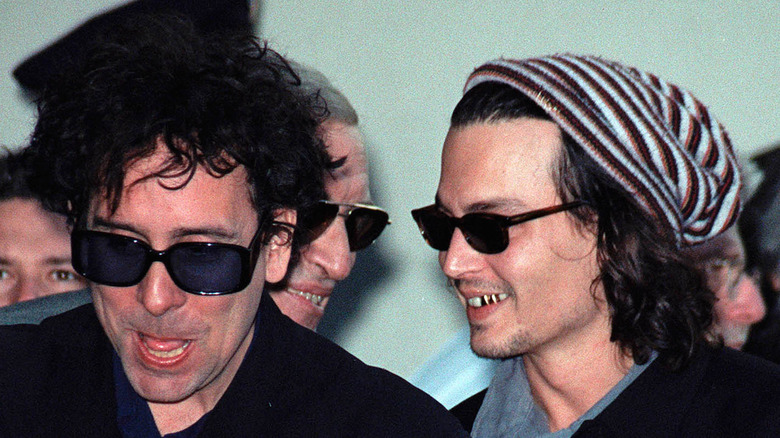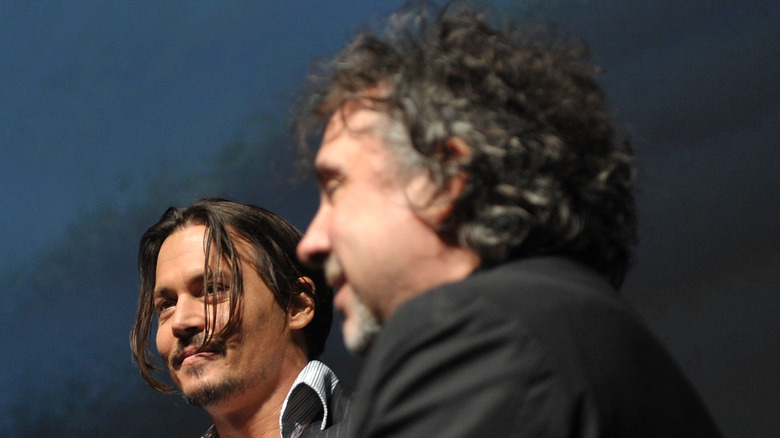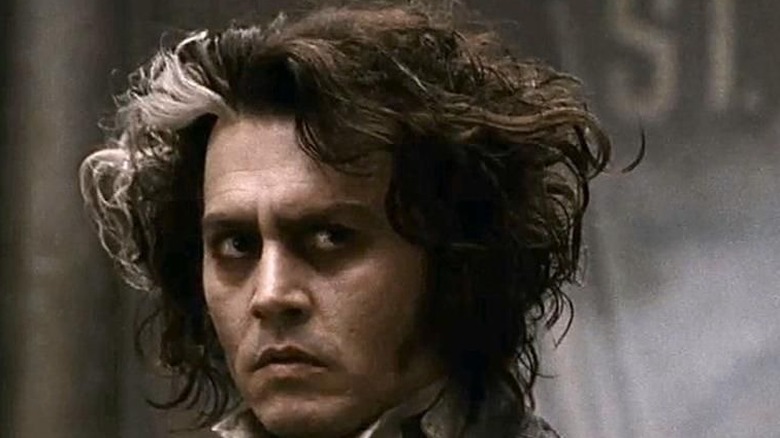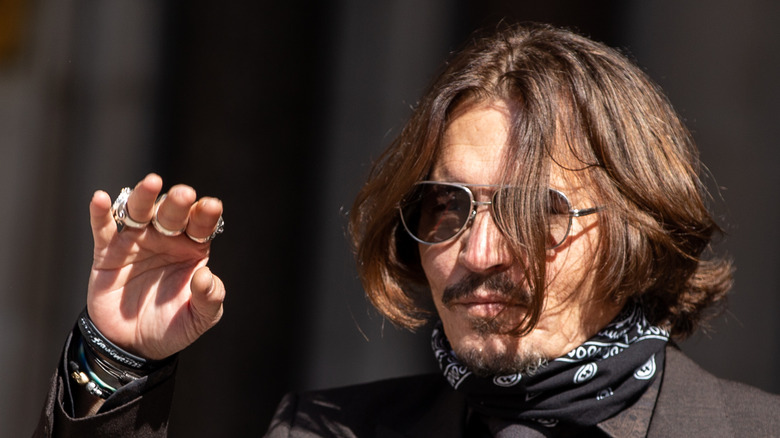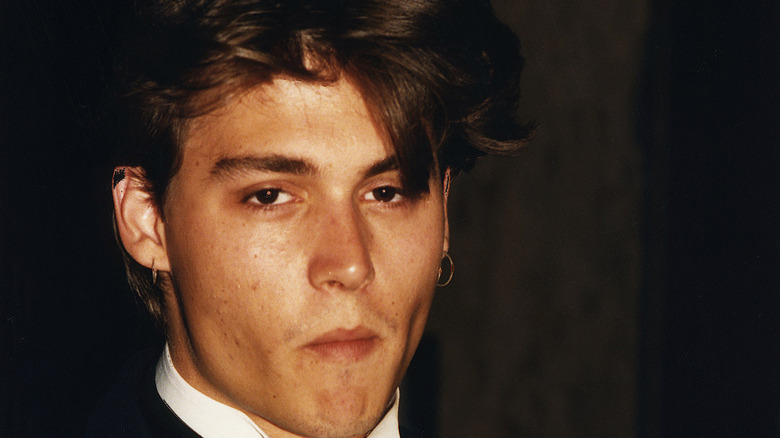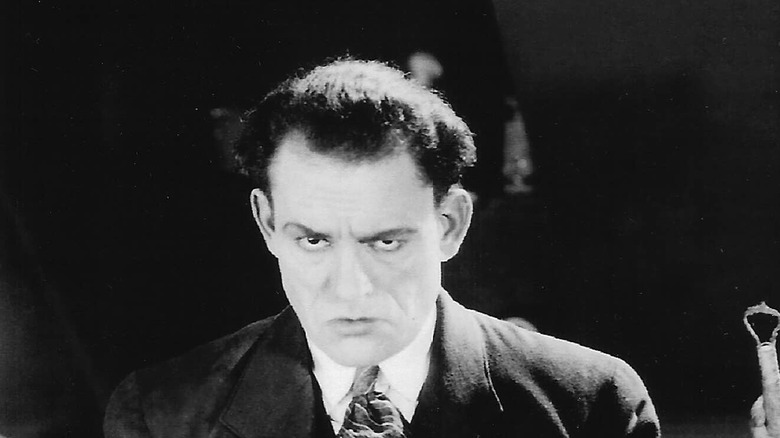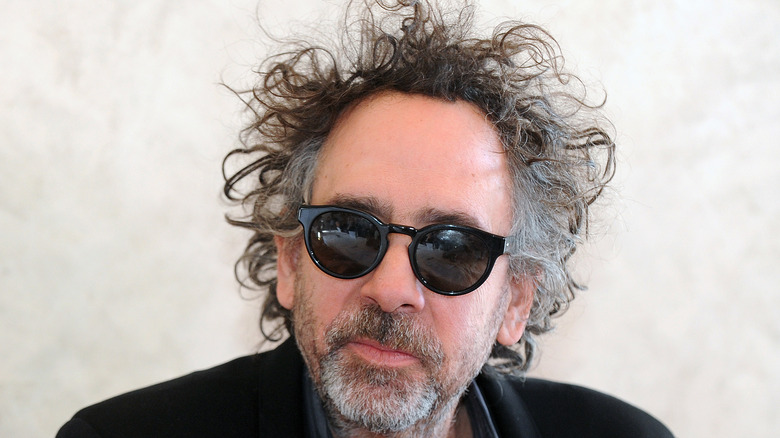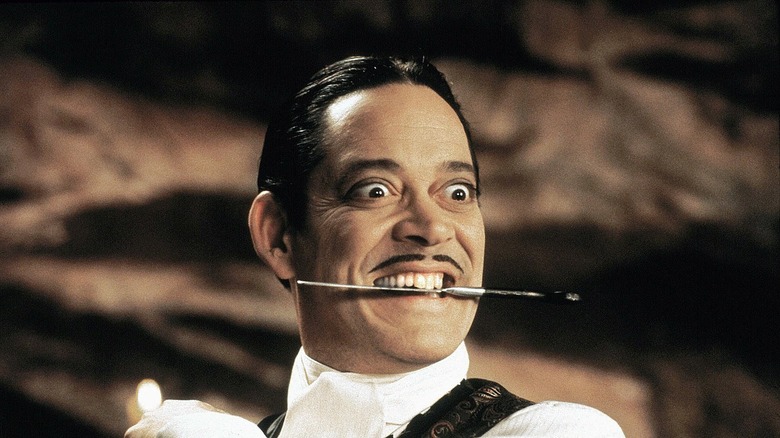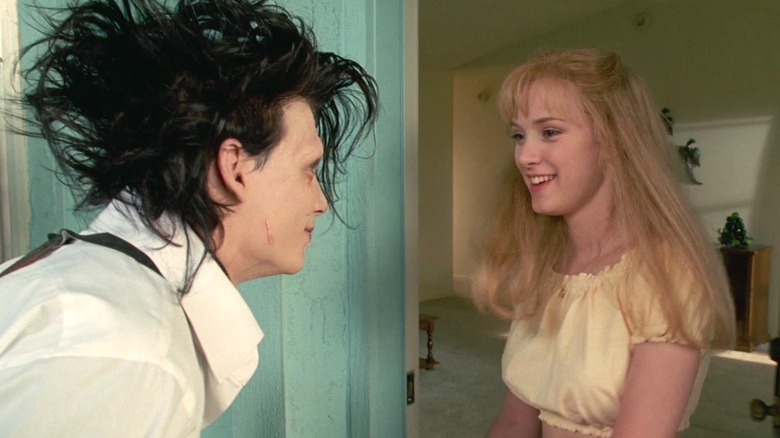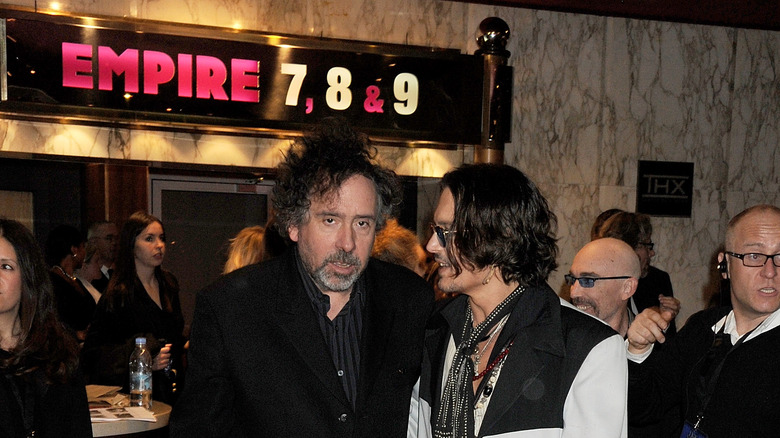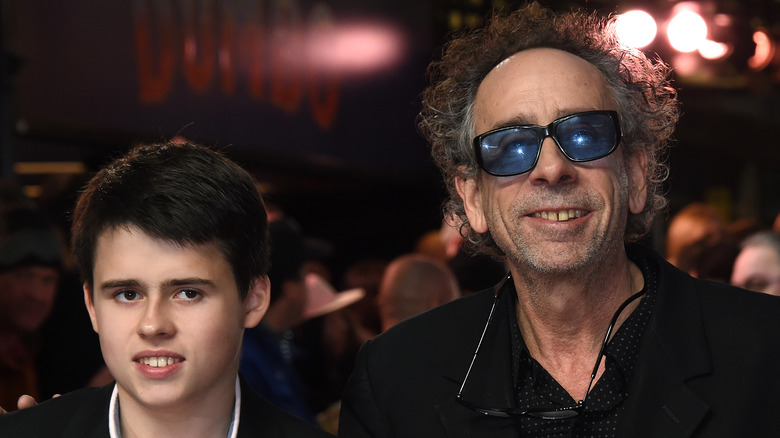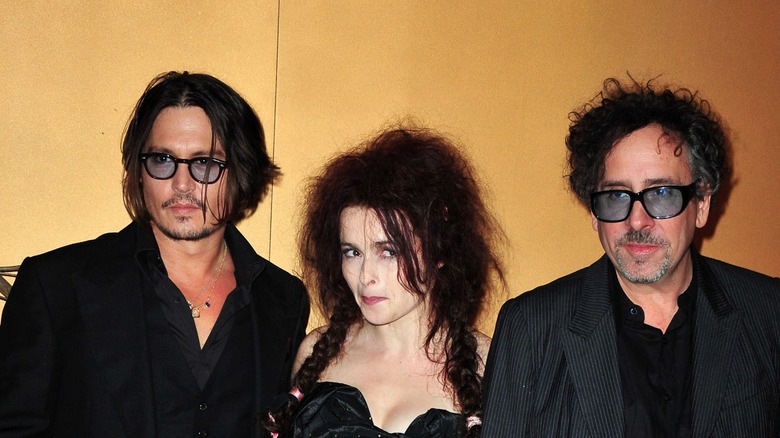The Truth About Tim Burton And Johnny Depp's Relationship
We may receive a commission on purchases made from links.
You almost can't talk about Tim Burton without mentioning his frequent muse and longtime partner, Johnny Depp. The Hollywood iconoclasts have made so many unique, acclaimed, and successful (in some cases unexpectedly) films together that it's obvious their relationship goes beyond the average actor-director partnership.
The two have, in fact, been making films together for a span of three decades, beginning when 1990's "Edward Scissorhands" captivated audiences. As of 2021, they have made a total of eight films together, some of which — "Scissorhands" and "Ed Wood" chief among them — could be considered all time classics of cinema.
Over the years, their friendship has helped steer each other's careers and develop their respective legends. Any actor will tell you they must trust their director above all else, and Depp's clear trust in Burton has allowed both artists to explore the limits of cinematic storytelling — from the scary soap "Dark Shadows" to their deranged "Charlie and the Chocolate Factory" reboot — and in turn develop their own indelible styles. But offscreen, their relationship seems to be just as interesting as what we see in front of the camera, filled with heartbreak and weird conversation, with chosen familial connections and a whole lot of poo talk.
Tim Burton changed Johnny Depp's career
In the late '80s, Johnny Depp was just another teen heartthrob. Sure, he'd blown up (literally) in Freddy's first "Nightmare on Elm Street" and starred in eccentric auteur John Waters' film "Cry Baby." But mostly, he was known as the good-looking guy on one of Fox's first TV shows, the teen crime drama "21 Jump Street." According to legend, when Depp first read the script for Edward Scissorhands, he wept. But this much is certain: when he met Tim Burton in a coffee shop, they hit it off.
"You don't get that many times in your life where you just connect with somebody and it's really simple ... it's just there," said Burton in an LA Times article. According to that same article, the studios wanted Tom Cruise instead of the relative newcomer, and Burton had to fight to cast Depp.
The film's unique concept — a suburban twist on "Frankenstein" about a man with scissors for hands — would set the tone for both men's oeuvre together.
Depp would cement his reputation as a different type of movie star, one with decidedly more edge and an embrace of the macabre than many of his contemporaries. Burton would find himself a dependable leading man he could lean on again and again, whose bankability would steadily increase over the next two-and-a-half decades.
Burton's Charlie-centered Chocolate Factory strayed
Many Roald Dahl fans were ready for an adaptation of "Charlie and the Chocolate Factory" that held closer to the book than Mel Stuart's 1971 "Willy Wonka & the Chocolate Factory," considered a film classic but one that took considerable liberties with the source material.
Sure enough, Burton delivered a new Willy Wonka film that had a greater focus on Charlie, even putting his dad back into the story. Critics were quick to point out that this new version was closer to the book with one sizable exception: an entirely new Willy Wonka backstory.
Wonka's difficult childhood and strained relationship with his father wasn't in the book or the 1971 "Wonka," but now, for better or worse, we knew why the candy baron was such an eccentric. The explanation put forward by screenwriter John August (and quoted in the above Chicago Tribune article) was "When you're watching a movie for two hours, you have the need to understand why he is the way he is."
Shared abstract thinking
Both Burton and Depp have opened up about the fact that they hit it off almost immediately. Any fan of either artist can only wish to have been a fly on the wall during that meeting. But it seems like their initial conversations ever since have continued to be as colorful, jovial and weird as a fan could only imagine.
In a July 2009 Comic-Con appearance, according to MTV.com, Burton said about Depp, "It's very nice to have someone that you can have a completely abstract conversation with and leave the room, feel like everything's fine, and then realize that if you pick it apart, you have absolutely no idea what either of you said."
It would probably be captivating to watch these two having a casual, abstract conversation. Even if none of it would make any sense to anybody but them. Which is also probably what it would be like to sit in a meeting where Tim Burton pitches an idea about an animated movie centered on a sweet zombie wife.
They have their own shared language
In 2017, a heavily-sourced, in-depth film study essay explained Johnny and Tim's way of communicating onset as a type of verbal shorthand. "They would be speaking normal language, though shorter sentences, on the sets with everyone present but no one would be able to understand it but the person who it is intended for. A little saying, a gesture and certain look of the director will get a look out of the actor that will be termed as 'just what the doctor ordered'."
A film director usually has a vision for how the film should look as a whole, while an actor should have a vision for how their character should look, act, and interact. To create a film that works, the director's vision and the actor's vision ideally sync up. Unfortunately, just as often as not on movies this does not happen, but given the longstanding working relationship between these two, it doesn't seem to be a problem.
So it would make sense that they can get into each other's vision with a few words and looks that only they can understand. Especially since they've both proven their vision is far from ordinary.
Burton appreciates Depp's emotive face
In a 2008 LA Times article, Mark Salisbury dug into Depp and Burton's process going into "Sweeney Todd: The Demon Barber of Fleet Street." In it, both men expressed some trepidation about Depp singing Stephen Sondheim's lyrics. But for Burton, he wanted Depp in the role of the demon barber because, along with other factors, Burton appreciates Depp's ability to emote so well through his looks and expressions. "Johnny can, just by looking and not saying anything, project pain and sadness and anger and longing," Burton said.
In the same article, both artists discuss their appreciation of the performances of classic actors from the 1920s and '30s whose performances were marked by their rich ability to emote through their facial expressions, especially in films made before spoken dialogue. Depp certainly filled "Sweeney Todd" with a wide range of looks and emotions showing excitement, depression, murderous rage and melancholy love.
Depp is a hands-off actor
Johnny Depp famously never watches his own movies. In an industry dominated by image and vanity, it's actually more common than you'd expect.
Depp's hands-off approach can be a blessing for directors who don't necessarily need somebody else looking over their shoulders at the dailies, asking to reshoot a scene because the actor doesn't like how they look. The director is in charge of the production and that can be difficult if a lead actor wants to challenge the director's decisions.
In an LA Times article, Burton talked about how much he appreciates the fact that Depp isn't interested in reviewing his performances.
"You're not having to sit there and go through the angst of somebody looking at the monitor. I love the fact that he doesn't like watching himself ... Keeps things moving, grooving, it's great," Tim Burton said.
Depp's star grew with and without Burton
When 2003's "Pirates of the Caribbean: The Curse of the Black Pearl" came out, Johnny Depp entered the rarefied air of an actor that studios would do almost anything to employ. While this indulgence might have contributed to Depp's recent breakdown, the ensuing decade-and-a-half of blockbusters makes it strange to think of a time when Depp wasn't a household name.
Even looking beyond the Burton films, Depp engineered a career surge practically unrivaled by Hollywood leading men: A total of four blockbuster "Pirates" films, the delightful "Rango," and "Finding Neverland" are among the highlights. But, having Burton's blockbusters almost every other film during this period certainly didn't hurt. Ultimately, Burton's early loyalty paid off.
"Most of the times we've worked together he's had to go into great big battles to get them to hire me," Depp one said in an LA Times article. "I feel so lucky to be along for the ride, more than a couple few times."
They both idolize Lon Chaney
Tim Burton and Johnny Depp seem to have bonded over a wide range of artistic influences. But one of those connecting fibers must be their appreciation of an actor who died over 90 years ago, and is known mostly for playing the wolfman or the phantom of the opera if modern audiences know him at all.
"From day one, we've talked about people like Lon Chaney," said Burton in an LA Times article. "He is Lon Chaney. And that's what always got me into movies."
In another LA Times article, Depp heaped praise on the actor. "[John] Barrymore was a master, but the king for me was Lon Chaney. You go back and watch films like 'The Penalty' and see this rage and sadness, this huge range of emotions, without the luxury of dialogue."
Depp sees Burton as a rare True Artist
Depp has long been known for airing his disdain towards Hollywood. In a 1997 Hello! Magazine interview (via the Johnny Depp Zone Interview Archive), he talked about how he could make more money doing "dumb comedies or slick Hollywood garbage." In a 1997 Vanity Fair interview, he added: "I just don't know if movies can ever be considered art, because there's so much money involved. It's all about commerce. I don't think that art can come from that place. But, I aspire to be an artist someday."
Yet in the 2008 LA Times piece about Depp and Burton, Depp said about Burton, "Without embarrassing him, he's a true artist, which is something I wasn't sure was possible in today's cinema. But he's the real thing. He's a visionary, an auteur, totally uncompromising."
Depp would also say in the same piece, "He provides an atmosphere that you can try anything. It's so liberating . . . which is the most important thing for an actor."
Burton is reportedly still fighting for Depp
Looking at Johnny Depp's long climb to the top of the Hollywood pyramid, one can only be struck by how quickly he fell. It's been quite a ride. In 2018 Depp's bitter divorce from Amber Heard was drawing a lot of press, much of it detailing his vitriol towards seemingly almost everybody.
In 2020 it was announced that Depp was being dropped from the newest "Fantastic Beasts and Where to Find Them" film, his last remaining blockbuster role after Disney axed him from the "Pirates of the Caribbean" franchise. Most of the attention Depp has received recently comes from his back-and-forth battle against Heard, as well as recent battles with everybody from his management to, seemingly, himself.
Needless to say, this kind of attention is undesirable for studios betting tens and in some cases hundreds of millions of dollars on projects. He has an upcoming movie scheduled, but it doesn't look like it will necessarily deliver the huge paychecks Depp has grown accustomed to.
Burton fans can look forward to a new TV project about the Addams Family, one in which there are rumors he's reportedly fighting to get his longtime friend a role, as Gomez Addams.
Burton was there for Depp during his split with Winona
Tim Burton was front and center when Johnny Depp and Winona Ryder fell in love and got engaged during "Edward Scissorhands." "They could have split up in mid-shoot," said Burton in Ryder's biography. Of course, he was also front and center when they broke up, while Depp was filming "Ed Wood" with the director.
According to a Mirror UK article, Burton said he would show up to the set sobbing. After the breakup, "I felt weird to be around him like he wasn't acting like Johnny anymore. It's almost like Winona took Johnny's soul, Johnny's love." Yet Burton was there to keep Depp working and be his friend.
Burton and Helena Bonham Carter were also there for Depp after his split from Amber Heard, the divorce that began Depp's plummet from the A-list to the blacklist.
They've made history together
Some actors rack up appearances with famed directors the easy way: lots of minor roles and easy-to-schedule cameos, a la Robert Altman and Michael Murphy (11 collaborations), Christopher Nolan and Michael Caine (8 collaborations), or Rian Johnson and Joseph Gordon-Levitt (5 collaborations). But what has made the Burton-Depp partnership so unique is that Johnny Depp has been the unquestionable star of each film, with unquestionably the most on-camera time in all of them.
If you're looking for other partnerships that come close in terms of role size and decades-spanning partnership, you might consider Richard Linklater and Ethan Hawke (8 collaborations) or Martin Scorsese and Leonardo DiCaprio (6 collaborations, one more on the way) or Scorsese and Robert DeNiro (10 collaborations, one more on the way). Also worth mentioning is such classic pairings as Sydney Pollack and Robert Redford (7 collaborations) and John Ford and John Wayne (an astounding 21 different collaborations between 1928 and 1963). But even adjusted for inflation, it's unlikely that any of those groupings had as high a box-office batting average.
While "Ed Wood" made less than $6 million, it won two Academy Awards and critical acclaim. Among the others, "Charlie and the Chocolate Factory" made $475 million and "Alice in Wonderland" surpassed $1 billion worldwide. Even "Edward Scissorhands" made a $60 million profit.
Depp is godfather to Burton's child, Billy Ray
When Tim Burton and Helena Bonham Carter had their first child, son Billy Ray Burton in 2003, they tapped Burton and Bonham Carter's frequent collaborator to be the boy's godfather.
"He's blood. He's family," Depp said about Burton in an LA Times interview. But while not technically of the same bloodline, Depp is connected to Burton and Bonham Carter through the title. Over the years, it has been fun for fans to see Billy attending events with his father, and with a godfather like Depp the boy will likely have a lot of artistic encouragement, as Depp has shown his willingness to support children.
Johnny Depp and Billy Ray Burton may be among the most famous, but they certainly aren't the only celebrity godparent pairing.
They get the same poo jokes
Read through interviews and articles, and you'll find quite a few references to Depp and Burton's shared love of scatological humor.
According to one of the previously-referenced LA Times articles, when Depp and Burton met they bonded "over a love of pop culture, old-time horror movies, resin grapes and poo jokes." This sounds at first like it might be an exaggeration, or at the most a funny one-time anecdote. But no, apparently their love of poo jokes is an actual longstanding thing.
When Burton and Helena Bonham Carter split in 2014, Playboy asked Bonham Carter who "gets" Johnny Depp, good friends with both. According to Vanity Fair, her response was "Oh, Tim can have him! They get the same poo jokes. Nothing will separate them."
So, where does the Burton/Depp partnership go from here? The latter's personal implosion and scandalous headlines regarding his relationship with ex-wife Amber Heard have been well-documented in recent years, reportedly costing him roles. But Hollywood has shown time and again that it loves a comeback — and it seems safe to say that if and when Johnny Depp is ready to mount one (and if the aforementioned "Addams Family" series isn't already it), Tim Burton will have a script waiting for him.
